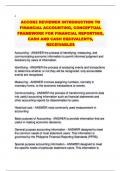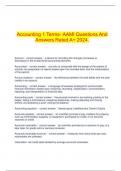Exam (elaborations)
ACCOB2 REVIEWER INTRODUCTION TO FINANCIAL ACCOUNTING, CONCEPTUAL FRAMEWORK FOR FINANCIAL REPORTING, CASH AND CASH EQUIVALENTS, RECEIVABLES
- Module
- Institution
ACCOB2 REVIEWER INTRODUCTION TO FINANCIAL ACCOUNTING, CONCEPTUAL FRAMEWORK FOR FINANCIAL REPORTING, CASH AND CASH EQUIVALENTS, RECEIVABLES...
[Show more]




